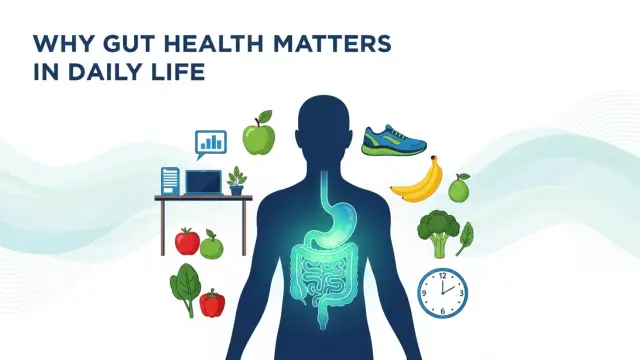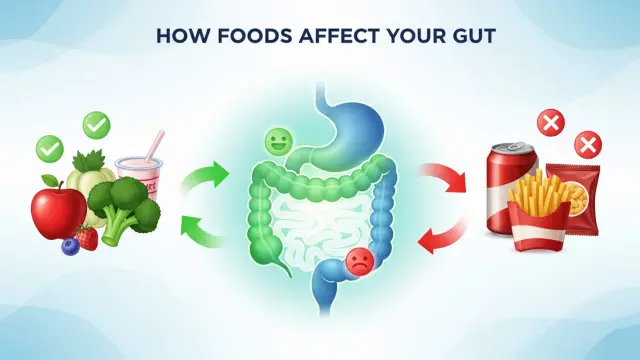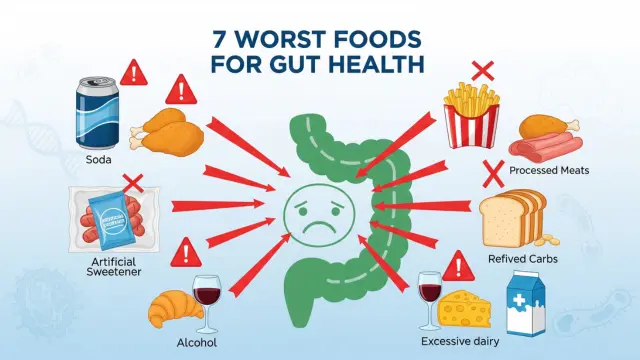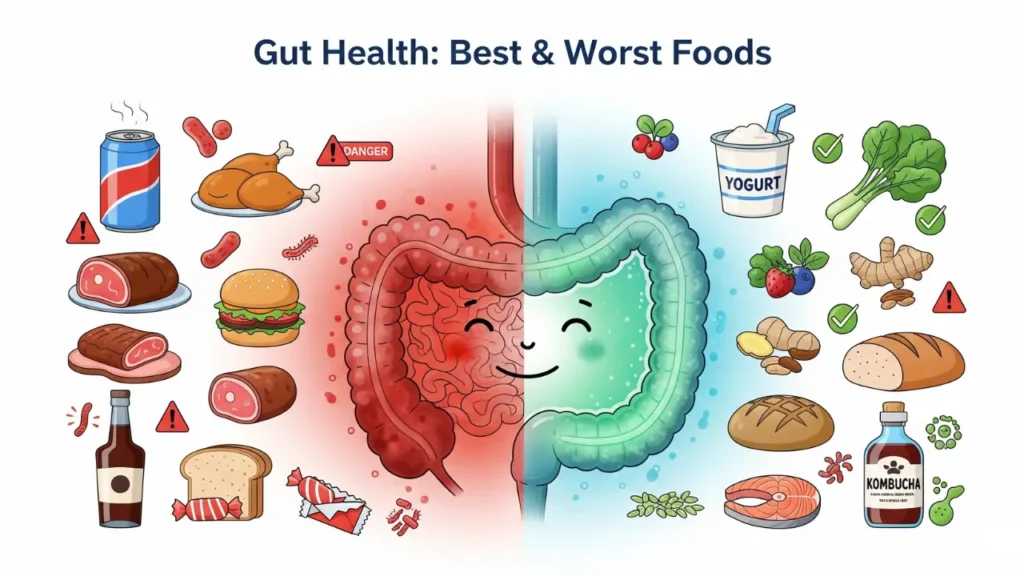Gut health is about so much more than just avoiding stomach pain or bloating. Research now shows that the foods we eat every day shape digestion, mood, immunity, skin health, and even weight. The problem is that many of our everyday foods quietly harm the balance of good bacteria in the gut. These are often called the worst foods for gut health.
In this guide, we’ll take you through 7 of the biggest culprits and explain why they can affect not just your gut but your whole body. The good news is you don’t have to give up everything you love. We’ll also share the best foods and simple swaps to help your gut thrive so you can start feeling better from the inside out.
Why Gut Health Matters in Daily Life
Your gut does more than digest food. It’s like the control center for many parts of your body. Inside your gut live trillions of bacteria, fungi, and microbes. Together they form the gut microbiome. When this system is balanced, you feel energetic, focused, and healthy. But when it’s out of balance, the effects spread far beyond digestion.

Poor gut health has been linked to:
In simple words, when your gut is off, your whole body feels the impact. That’s why knowing which foods hurt and which foods heal is the first step towards better health.
“Gut health is critical for overall well-being, influencing not just digestion but immunity, skin, hormones, energy, and mental health… what we eat is another tool to improve mood and cognition.”
— Dr. Emily Leeming, author of Genius Gut
How Foods Affect Your Gut
Every bite you eat sends a message to your gut. Some foods are fuel for the good bacteria that keep your digestion smooth and your body strong. Others are toxic to your gut lining, trigger inflammation, and encourage bad bacteria to grow.

When you eat processed sugary or greasy foods, your gut can’t break them down. This can lead to:
On the other hand fiber fiber-rich fruits, vegetables, whole grains, and fermented foods are medicine for your microbiome. They feed good bacteria, help you absorb nutrients, and keep digestion moving.
In short, food can heal or harm your gut. The daily choices you make at the table decide if your microbiome stays in balance or tips into trouble.
📌 Note: Eating the wrong foods can make gut problems much worse—but the real hidden danger is a blue parasite that experts link to 97% of digestive issues. If you’re struggling with gut problems, you must try this natural breakthrough—or watch this shocking video to see the #1 sign you already have it. Click to watch the video
7 Worst Foods for Gut Health
Your gut is home to trillions of bacteria that control digestion, immunity, and even your mood. But certain foods can disturb this balance, weaken the gut lining, and create long-term problems. Below are the 7 worst foods for gut health — and why they harm you:

1. Processed Meats
Bacon, hot dogs, sausages, and deli meats are packed with nitrates, preservatives, and unhealthy saturated fats. These additives feed bad bacteria and kill good ones. Over time, this can trigger gut inflammation, constipation, and even colon issues.
2. Fried and Greasy Foods
Deep-fried snacks, burgers, fries, and fast food are loaded with unhealthy oils. These oils are hard for your stomach to break down, slowing digestion and leaving food to sit too long in your gut. This encourages bad bacteria to grow and causes bloating, acid reflux, and discomfort.
3. Refined Sugar and Sweets
Candies, pastries, sodas, and desserts overload your gut with sugar. High sugar intake feeds yeast and bad bacteria, which grow quickly and push out good gut microbes. This imbalance (called dysbiosis) can trigger inflammation, cravings, and weaken your immune system.
4. Artificial Sweeteners
Diet sodas, sugar-free gums, and low-calorie snacks often contain aspartame, sucralose, or saccharin. Research shows these sweeteners can confuse your gut bacteria, reducing their diversity. This can lead to poor blood sugar control, gas, diarrhea, and a weaker metabolism.
5. Refined Carbs
White bread, white pasta, crackers, and pastries are made from refined flour with very little fiber. Fiber is the main food source for your good gut bacteria. Without it, healthy bacteria starve while bad bacteria thrive. This can cause constipation, slow digestion, and reduced gut resilience.
6. Alcohol
Excessive drinking irritates the stomach lining and kills good bacteria. Alcohol also increases intestinal permeability (often called leaky gut), where toxins can leak into your bloodstream. This can cause inflammation that spreads to other organs like the liver, brain, and heart.
7. Dairy (for lactose-intolerant people)
Milk, cheese, and ice cream contain lactose, a sugar that many people can’t digest properly. When lactose reaches the colon undigested, it ferments and produces gas. This causes bloating, cramps, and diarrhea. Even if you’re not fully intolerant too much dairy can still upset your gut balance.
You can also check the worst drink for gut health.
How Bad Gut Health Affects You
Your gut isn’t just for digestion. It’s like a control center that talks to almost every part of your body. When your gut is out of whack, the effects show up in weird ways.

- 1. Brain and Mood: Bad gut health can cause anxiety, stress, and even depression. That’s because your gut produces neurotransmitters like serotonin – the “happy chemical”. When your gut bacteria are out of balance, your brain doesn’t get the right signals.
- 2. Immune System: Almost 70% of your immune system lives in your gut. If bad bacteria take over your body can’t fight off infections. You may get more colds or, flu, or take longer to recover from illness.
- 3. Skin Problems: Acne, eczema, and inflammation often come from an unhealthy gut. Toxins leak into your bloodstream and cause breakouts on your skin. If your skin issues are specifically related to gut health, then you should read about the gut-skin connection explained in our Prime Biome reviews article.
- 4. Heart Health: Bad gut bacteria can raise your cholesterol and blood pressure. Over time, this increases your risk of heart disease.
- 5. Weight Gain and Cravings: A weak gut microbiome makes it harder to burn fat. It also triggers strong cravings for sugar and junk food and creates a cycle of overeating.
- 6. Energy Levels: When digestion is poor, your body absorbs fewer nutrients. You feel tired, foggy, and unmotivated.
- 7. Inflammation in Joints: An imbalanced gut can cause inflammation everywhere in your body, which can lead to joint pain or stiffness.
Alternative: Best Foods for Gut Health
Some foods harm your gut, others heal it, grow healthy bacteria, and keep your digestion smooth. Adding the right foods to your diet can make a big difference in your energy, mood, and overall health.
- 1. Fermented Foods: Yogurt, kefir, sauerkraut, kimchi, and miso are full of probiotics – live bacteria that balance your gut. They digest, reduce bloating, and protect your immune system.
- 2. High Fibre Fruits and Veggies: Apples, bananas, berries, broccoli, carrots, and leafy greens feed good bacteria in your gut. Fibre is fuel for probiotics, helping them multiply and strengthen digestion.
- 3. Whole Grains: Oats, quinoa, barley, and brown rice are prebiotics – special fibres that help healthy bacteria thrive. They also regulate bowel movements and reduce inflammation.
- 4. Legumes and Beans: Lentils, chickpeas, black beans, and kidney beans are great for feeding gut bacteria. They also keep you full for longer and support stable blood sugar.
- 5. Healthy Fats: Foods like olive oil, avocado, chia seeds, and walnuts reduce gut inflammation and improve nutrient absorption. Omega-3 fatty acids from fatty fish like salmon also support gut lining health.
- 6. Herbs and Spices: Ginger, turmeric, garlic, and fennel reduce inflammation, ease bloating, and support smoother digestion.
- 7. Plenty of Water: Hydration is key. Water helps fibre do its job and prevents constipation, which keeps the gut environment healthy.
Worst Foods For Gut vs Best Swaps (Quick Guide)
Our Verdict
Your gut is more powerful than you think. It does more than digest food — it controls your weight, immunity, mood, and how well your brain works. Eating the wrong foods daily can quietly harm your gut and trigger problems all over your body.
The good news? You can turn it around by making simple swaps. Cut out processed, fried, and sugary foods. Add more fiber, probiotics, and whole foods. Over time, these small changes can rebalance your microbiome, reduce inflammation, and make you feel better from the inside out.
If you care about long-term health, protecting your gut is non-negotiable. Treat it well and it will reward you with more energy, stronger immunity, and a happier body.
FAQs
Q1. What foods damage the stomach lining?
Spicy foods, alcohol, too much caffeine and processed junk foods can irritate and inflame the stomach lining and cause ulcers and discomfort.
Q2. What are the worst foods for digestion?
Fried foods, processed meats, refined carbs and dairy (for lactose intolerant) are harder to digest and cause bloating or constipation.
Q3. What foods kill the gut?
Sugar snacks, artificial sweeteners, ultra-processed foods and too much red meat can disrupt gut bacteria and cause long-term inflammation.
Q4. What are the best foods for gut health?
High fiber foods like oats, beans and lentils and fermented foods like yogurt, kefir, kimchi and sauerkraut feed good gut bacteria.
Q5. Which foods heal the gut?
Bone broth, bananas, papaya, ginger and probiotic rich foods soothe the gut lining and restore balance in the microbiome.
Q6. Which foods kill stomach bacteria?
Garlic, ginger, turmeric and fermented foods can naturally fight bad bacteria and support good gut flora.
Q7. What kills good gut bacteria?
Overuse of antibiotics, high sugar intake, alcohol and constant stress are major culprits that reduce good gut bacteria.
Q8. What are gut friendly foods?
Fruits, vegetables, whole grains, legumes, nuts, seeds and probiotic foods are good for building a healthy gut.
Q9. What are bad foods for gut health?
Processed foods, fried snacks, sugar drinks, alcohol and artificial sweeteners are the worst for gut health.
Q10. What are the worst foods for your gut long term?
Fast foods, refined carbs, processed meats and excess alcohol not only harm digestion but also increase risk of chronic issues like IBS, obesity and even weakened immunity.


Recent Posts